Guide to Poly Partner Being With Someone Else Hurts
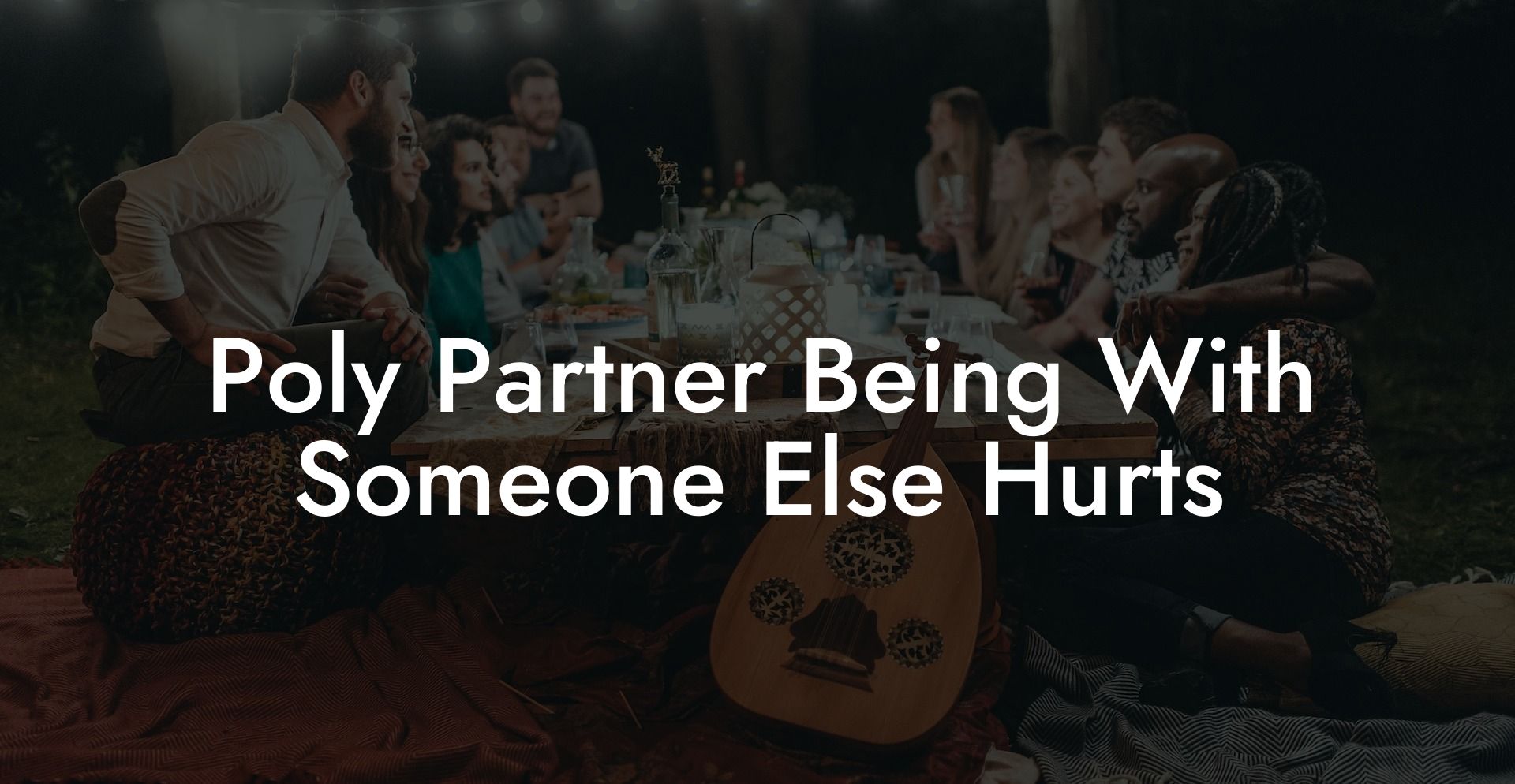
Navigating the emotional landscape of polyamory isn’t always sunshine and rainbows, even for those who consciously choose this lifestyle. Sometimes, you may find that your poly partner being with someone else hurts, sparking feelings of jealousy, insecurity, or emotional pain. This comprehensive guide dives deep into why these feelings occur, offers strategies for managing them, and provides practical advice for communicating with your partner. Whether you’re new to polyamory or a seasoned practitioner facing these challenges, this guide will help you understand, manage, and ultimately heal from the emotional hurt that can arise when your partner connects with someone else.
Quick Links to Useful Sections
- Understanding the Emotional Hurt in Polyamory
- Why Does It Hurt? The Roots of Jealousy and Insecurity
- Self-Awareness: Recognizing and Validating Your Emotions
- Communication: The Key to Resolving Emotional Hurt
- Practical Strategies for Managing the Hurt
- Exploring the Role of Personal Growth
- Balancing Multiple Connections
- When to Seek Professional Help
- Real-Life Stories: Learning from Others
- FAQ: Your Poly Partner Hurts Questions Answered
- Resources and Community Support: Your Next Steps in Navigating Emotional Hurt in Poly Relationships
Understanding the Emotional Hurt in Polyamory
In polyamorous relationships, it’s common to experience a wide range of emotions, excitement, fulfillment, and even occasional heartache. The very nature of polyamory, which embraces multiple simultaneous connections, means that feelings like jealousy and insecurity can emerge, even when all parties have given their consent. It is important to recognize that these feelings are not a sign that polyamory is inherently flawed. Rather, they are a natural part of human psychology, especially when it comes to love, attachment, and self-worth.
When your poly partner is with someone else, the hurt you feel might stem from a variety of sources: fear of being replaced, insecurity about your own worth, or even just the natural pangs of jealousy. Understanding that these emotions are normal and common is the first step in addressing them constructively.
Why Does It Hurt? The Roots of Jealousy and Insecurity
Jealousy in polyamorous relationships often arises from deep-seated fears and insecurities. Even if you intellectually understand the poly philosophy, your emotions may not always follow suit. These feelings can be linked to past experiences, attachment styles, or societal conditioning that values exclusivity in romantic love. When you see your partner investing time, affection, or intimacy in another connection, it can trigger feelings of inadequacy or fear of losing your unique bond.
Insecurity might manifest in thoughts like “Am I enough?” or “Will I be replaced?” These internal dialogues are natural, yet they can be distressing. Acknowledging that the hurt you feel is a normal response can help you approach it with compassion toward yourself.
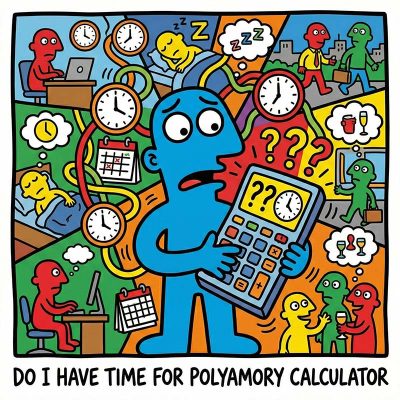
Love is infinite, but your calendar is brutally finite. The fantasy is deep connection; the reality is often just exhausted "calendar tetris." Promising time you don't actually have isn't romantic, it’s a recipe for burnout and broken trust. That sinking feeling when you have to cancel again? That’s the sound of overextension destroying your relationships.
This calculator forces you to confront the math of your life. Do you actually have space for another heart, or are you just setting everyone up for disappointment?
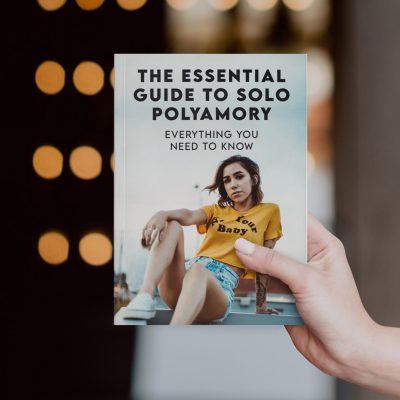
The fantasy is total autonomy and connection. The reality? It can feel like drowning in scheduling chaos and misunderstood expectations. That anxiety you feel isn’t just stress; it’s the wobble of living without a default "anchor." Without a solid architecture, Solo Polyamory stops being a life design and starts being a recipe for burnout and confusion.
The Essential Guide replaces the drift with a concrete anchor. We provide the "Solo Ethic," boundary scripts, and burnout protocols needed to protect your peace. Don't just date around—build a life that actually works for you.
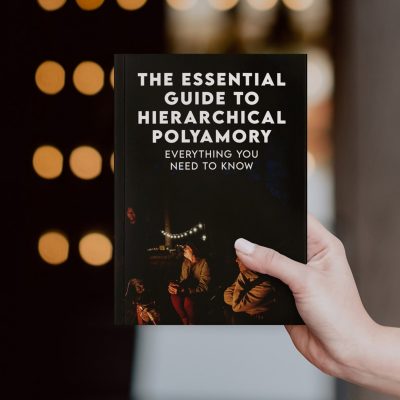
Hierarchy sounds like a corporate org chart until someone gets their feelings hurt. That stomach-turning fear that you are just a "secondary" who can be fired at any time is real. If your relationship feels like a secret ranking system, you are doing it wrong.
Ambiguity is where resentment grows. The Essential Guide replaces the "who matters more" panic with a concrete charter. We provide the scripts and equity guardrails needed to protect every heart in the polycule. Stop guessing and start building.
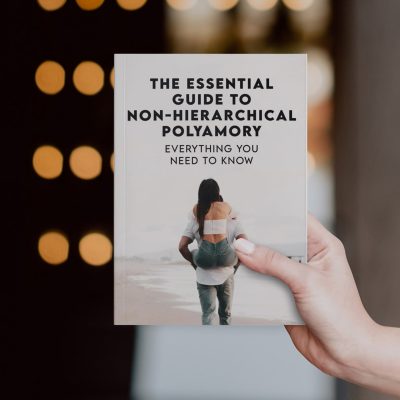
The ideal is pure equality. The reality? It often slides into hidden rankings where someone gets hurt. That sinking feeling that you are secretly a "secondary" despite the label? That is your intuition detecting couple privilege. Ambiguity is where resentment thrives.
The Essential Guide replaces vague promises with concrete governance. We provide the charters, equity tools, and jealousy protocols needed to ensure "non-hierarchical" isn't just a fantasy. Stop guessing who matters most. Build a network that is actually fair.

The fantasy is total autonomy and connection. The reality? It can feel like drowning in scheduling chaos and misunderstood expectations. That anxiety you feel isn’t just stress; it’s the wobble of living without a default "anchor." Without a solid architecture, Solo Polyamory stops being a life design and starts being a recipe for burnout and confusion.
The Essential Guide replaces the drift with a concrete anchor. We provide the "Solo Ethic," boundary scripts, and burnout protocols needed to protect your peace. Don't just date around—build a life that actually works for you.

Hierarchy sounds like a corporate org chart until someone gets their feelings hurt. That stomach-turning fear that you are just a "secondary" who can be fired at any time is real. If your relationship feels like a secret ranking system, you are doing it wrong.
Ambiguity is where resentment grows. The Essential Guide replaces the "who matters more" panic with a concrete charter. We provide the scripts and equity guardrails needed to protect every heart in the polycule. Stop guessing and start building.
Self-Awareness: Recognizing and Validating Your Emotions
The first step toward healing is self-awareness. Take time to reflect on your emotions without judgment. Journaling can be an effective tool for this process. Write about what specifically hurts you, what triggers your jealousy, and what you fear losing. This honest self-assessment will not only validate your feelings but also provide insights into how you can address them.
Remember that your feelings are valid, even if they seem contradictory to your poly values. It’s okay to feel hurt, and recognizing that emotion is a powerful step toward resolving it.
Communication: The Key to Resolving Emotional Hurt
Open, honest communication is essential in any relationship, but it’s especially critical in polyamory. When you feel hurt, consider discussing your emotions with your partner in a calm and non-accusatory manner. Using “I” statements can help frame your feelings without sounding confrontational. For example, saying “I feel insecure when I see you with someone else” is more constructive than “You make me jealous.”
Regular check-ins can provide a structured time to discuss feelings, update boundaries, and ensure that all partners feel secure. These conversations should be ongoing rather than one-off events, as emotions and circumstances can change over time.
Practical Strategies for Managing the Hurt
Once you’ve identified and communicated your feelings, there are several strategies you can employ to manage the emotional hurt:
- Establish Personal boundaries: Work with your partner to set clear guidelines about what makes you feel safe and respected. This might include discussing how much detail you want to know about other relationships or agreeing on specific times for individual connection.
- Practice Self-Care: Invest time in activities that boost your self-esteem and provide comfort. Whether it’s exercise, meditation, creative pursuits, or spending time with supportive friends, self-care is critical for emotional resilience.
- Seek External Support: Consider joining support groups or seeking therapy with professionals experienced in non-monogamous dynamics. Speaking with others who understand your experience can help normalize your feelings and provide practical advice.
- Focus on Your Strengths: Remind yourself of your unique qualities and the value you bring to the relationship. Confidence can help mitigate feelings of inadequacy.
- Engage in Mindfulness Practices: Mindfulness can help you stay present and reduce the intensity of negative emotions. Techniques like deep breathing, guided meditation, or yoga can be incredibly helpful.
Exploring the Role of Personal Growth
One of the unexpected benefits of navigating hurt in a polyamorous context is the opportunity for personal growth. The challenges you face can serve as catalysts for self-improvement. As you work through jealousy and insecurity, you may find that you develop stronger emotional resilience and a deeper understanding of your own needs and boundaries.
This growth not only improves your relationship with your partner but also enriches your overall life experience. Embracing these challenges as opportunities to learn can transform painful moments into stepping stones toward a more confident and self-aware you.
Balancing Multiple Connections
Managing emotional hurt often involves re-evaluating how you balance your time and energy among multiple relationships. It might help to assess whether your current structure supports your well-being or if adjustments are needed. For example, if you find that the time spent with other partners is contributing to your insecurity, you might discuss with your partner how to create more quality time for your connection.
Remember, balance in polyamorous relationships is not static. It’s a dynamic process that requires regular reflection and negotiation. Be open to experimenting with different arrangements until you find a system that feels supportive and nurturing.
When to Seek Professional Help
Sometimes, the hurt can feel overwhelming, and despite your best efforts, it may be difficult to manage on your own. If you find that feelings of jealousy, insecurity, or emotional pain are interfering with your ability to function or enjoy your relationships, it might be time to seek professional guidance.
A therapist or counselor experienced in non-monogamous relationships can offer a safe space to explore your emotions and provide strategies tailored to your situation. Professional support can help you develop healthier coping mechanisms and facilitate more effective communication with your partner.
Real-Life Stories: Learning from Others
Many poly individuals have navigated the painful emotions associated with seeing a partner with someone else and come out stronger on the other side. For instance, one community member, Jamie, shared that early in their poly journey, feelings of hurt and jealousy were intense. Through regular communication and self-care practices, Jamie learned to reframe these emotions as signals for personal growth, ultimately leading to a deeper understanding of their own emotional landscape.
Another individual, Alex, described a turning point when they realized that their hurt stemmed from unresolved insecurities. With the help of a supportive group and professional counseling, Alex was able to work through their feelings and develop more secure attachment styles. These stories remind us that while the process can be challenging, the outcomes often include increased self-awareness, resilience, and a more authentic connection with one’s partner.
FAQ: Your Poly Partner Hurts Questions Answered
1. Why does it hurt when my poly partner is with someone else?
It’s common to feel hurt due to underlying insecurities, fear of being replaced, or societal conditioning that values exclusive intimacy. These feelings are natural and don’t necessarily reflect your partner’s actions.
2. Is feeling hurt a sign that polyamory isn’t for me?
Not at all. Feeling hurt can be a normal part of any relationship, monogamous or polyamorous. It’s important to address and manage these emotions rather than use them as a reason to abandon a poly lifestyle if it otherwise aligns with your values.
3. How can I communicate my feelings without causing conflict?
Use “I” statements to express your feelings without blaming your partner. For example, “I feel insecure when I don’t know how much time we have together,” invites conversation without sounding accusatory.
4. What practical steps can I take to manage jealousy?
Practice self-care, engage in mindfulness exercises, and consider speaking with a therapist. Regular check-ins with your partner and setting clear boundaries can also help manage jealousy.
5. Can the hurt eventually diminish over time?
Yes, with open communication, self-reflection, and mutual support, many people find that their hurt diminishes as they gain confidence and a better understanding of their emotional needs.
6. What if my partner doesn’t understand my feelings?
It may take time and repeated conversations for your partner to fully understand your emotional experience. Consider seeking couples counseling if communication continues to be challenging.
7. How do I know if my feelings are valid?
Your feelings are always valid. It’s important to acknowledge them, explore their origins, and address them constructively rather than dismiss them as “just jealousy.”
8. Should I consider taking a break if the hurt becomes too overwhelming?
If the emotional pain is interfering significantly with your well-being, a temporary break or space for self-reflection might be beneficial. However, this decision should be made in close communication with your partner.
9. Is professional therapy recommended for managing these emotions?
Yes, professional guidance from a therapist experienced in non-monogamous relationships can provide valuable tools to help you process your emotions and develop healthy coping mechanisms.
10. Where can I find additional resources on dealing with hurt in poly relationships?
Books like "The Ethical Slut" and "More Than Two", podcasts such as “Multiamory,” and online communities on Reddit and Facebook offer extensive insights and support.
Resources and Community Support: Your Next Steps in Navigating Emotional Hurt in Poly Relationships
- "The Ethical Slut" by Dossie Easton & Janet Hardy – A foundational book that offers insights into ethical non-monogamy and managing emotions.
- "More Than Two" by Franklin Veaux & Eve Rickert – Provides practical advice and personal stories about navigating multiple relationships and the associated emotional challenges.
- Podcasts: "Multiamory" and other relationship-focused shows feature expert discussions and personal testimonials that can help you understand and manage hurt in poly dynamics.
- Online Communities: Join supportive forums and social media groups dedicated to polyamory, such as Reddit’s r/polyamory or specialized Facebook groups, to share experiences and gain insights.
- Therapy and Counseling: Consider seeking guidance from a therapist or relationship coach experienced in non-monogamous dynamics to work through your feelings and develop healthy coping strategies.
By integrating these resources and strategies, you can navigate the emotional challenges of poly relationships with greater confidence and resilience. Remember, the journey to managing hurt is ongoing, but with open communication, self-reflection, and support, you can build deeper, more fulfilling connections that honor all aspects of your love life.

Love is infinite, but your calendar is brutally finite. The fantasy is deep connection; the reality is often just exhausted "calendar tetris." Promising time you don't actually have isn't romantic, it’s a recipe for burnout and broken trust. That sinking feeling when you have to cancel again? That’s the sound of overextension destroying your relationships.
This calculator forces you to confront the math of your life. Do you actually have space for another heart, or are you just setting everyone up for disappointment?

The fantasy is total autonomy and connection. The reality? It can feel like drowning in scheduling chaos and misunderstood expectations. That anxiety you feel isn’t just stress; it’s the wobble of living without a default "anchor." Without a solid architecture, Solo Polyamory stops being a life design and starts being a recipe for burnout and confusion.
The Essential Guide replaces the drift with a concrete anchor. We provide the "Solo Ethic," boundary scripts, and burnout protocols needed to protect your peace. Don't just date around—build a life that actually works for you.

Hierarchy sounds like a corporate org chart until someone gets their feelings hurt. That stomach-turning fear that you are just a "secondary" who can be fired at any time is real. If your relationship feels like a secret ranking system, you are doing it wrong.
Ambiguity is where resentment grows. The Essential Guide replaces the "who matters more" panic with a concrete charter. We provide the scripts and equity guardrails needed to protect every heart in the polycule. Stop guessing and start building.

The ideal is pure equality. The reality? It often slides into hidden rankings where someone gets hurt. That sinking feeling that you are secretly a "secondary" despite the label? That is your intuition detecting couple privilege. Ambiguity is where resentment thrives.
The Essential Guide replaces vague promises with concrete governance. We provide the charters, equity tools, and jealousy protocols needed to ensure "non-hierarchical" isn't just a fantasy. Stop guessing who matters most. Build a network that is actually fair.

The fantasy is total autonomy and connection. The reality? It can feel like drowning in scheduling chaos and misunderstood expectations. That anxiety you feel isn’t just stress; it’s the wobble of living without a default "anchor." Without a solid architecture, Solo Polyamory stops being a life design and starts being a recipe for burnout and confusion.
The Essential Guide replaces the drift with a concrete anchor. We provide the "Solo Ethic," boundary scripts, and burnout protocols needed to protect your peace. Don't just date around—build a life that actually works for you.

Hierarchy sounds like a corporate org chart until someone gets their feelings hurt. That stomach-turning fear that you are just a "secondary" who can be fired at any time is real. If your relationship feels like a secret ranking system, you are doing it wrong.
Ambiguity is where resentment grows. The Essential Guide replaces the "who matters more" panic with a concrete charter. We provide the scripts and equity guardrails needed to protect every heart in the polycule. Stop guessing and start building.
Aging And Long Term Care Planning As Solo Poly
Attachment Styles And Solo Polyamory
Autonomy And Self Partnership As Foundations
Avoiding Avoidance Disguised As Autonomy
Avoiding Being Treated As An Accessory Relationship
Balancing Independence And Intimacy
Balancing Multiple Partners Without Burnout
Barrier Use Conversations With Multiple Partners
Boundaries Versus Rules In Solo Poly Relationships
Breakups And Grief While Staying Solo
Building Emotional Availability As Solo Poly
Caregiving And Illness Support Without A Nesting Partner
Co Parenting Agreements And Boundaries
Co Parenting And Family Building As Solo Poly
Coming Out As Solo Polyamorous
Common Mistakes Partners Make With Solo Poly People
Common Mistakes Solo Poly People Make
Common Myths About Solo Polyamory
Communication Check Ins That Fit Solo Poly
Community And Chosen Family For Solo Poly People
Compersion And Neutrality Toward Partner Dating
Conflict Resolution Without Couple Default
Core Values Of Solo Polyamory
Creating Agreements That Preserve Independence
Creating Secure Attachment Without Traditional Milestones
Dating People Who Want Escalation
De Escalation As A Healthy Choice
Decentering Couple Norms And Escalator Scripts
Deciding Whether Solo Polyamory Is Right For You
Defining Relationship Depth Without Shared Living
Defining Success Without Traditional Milestones
Designing A Sustainable Solo Poly Life
Digital Safety And Privacy
Disability And Access Needs As Solo Poly
Emergency Contacts And Support Planning
End Of Life Planning And Legal Documents
Energy Management And Overextension Risks
Financial Independence And Entanglement Decisions
Finding Solo Poly Friendly Community
Friendships As Core Support Structures
Gifts Trips And Resource Boundaries
Handling Being The Newest Partner
Handling Judgment From Monogamous Culture
Handling Judgment From Poly Communities
Handling Last Minute Plan Changes
Holidays And Special Occasions As Solo Poly
Housing Choices And Living Alone
How To Disclose Solo Polyamory Early While Dating
How To Explain Solo Polyamory To Partners
In Person Events And Support Networks
Intersectionality In Solo Poly Experiences
Long Distance Relationships And Solo Poly
Maintaining Rituals Without Domestic Integration
Maintaining Self Partnership Through Loss
Managing Insecurity Without Default Reassurance
Managing Metamour Dynamics Without Centering A Couple
Managing Nre Without Losing Yourself
Navigating Jealousy As A Solo Poly Person
Navigating Marriage Offers As Solo Poly
Navigating Partners With Nesting Or Spouses
Pacing New Connections Ethically
Parallel Versus Kitchen Table Preferences
Parenting Without A Primary Partner Model
Pregnancy And Fertility Conversations For Solo Poly
Privacy And Information Sharing Consent
Processing Loneliness While Staying Solo
Protecting Personal Time Without Withholding Connection
Quality Time When You Do Not Share A Home
Race Gender And Class Factors In Solo Poly
Religion Culture And Family Expectations
Relocation And Maintaining Connections
Repair After Misunderstandings With Partners
Responding To Requests For Primary Status
Risk Profiles And Informed Consent
Screening For People Who Respect Autonomy
Self Worth Outside Relationship Status
Setting Expectations With Highly Partnered People
Sexual Health Agreements As A Solo Poly Person
Shared Housing With Friends And Community
Signs Solo Polyamory Is Working Well
Social Media Boundaries And Visibility
Solo Polyamory And Career Mobility
Solo Polyamory And Commitment
Solo Polyamory And Mental Health Support
Solo Polyamory And Metamour Relationships
Solo Polyamory Versus Being Single
Solo Polyamory Versus Non Hierarchical Polyamory
Solo Polyamory Versus Relationship Anarchy
Substance Use Boundaries And Consent
Testing Schedules And Disclosure Practices
The History And Evolution Of Solo Polyamory
Therapy And Coaching For Solo Polyamory
Time And Scheduling As A Solo Poly Person
Transparency Without Being Managed
Travel And Overnights Without Implied Escalation
Warning Signs Of Isolation Masquerading As Autonomy
What Commitment Looks Like Without Nesting
What Solo Polyamory Is And What It Is Not
Why People Choose Solo Polyamory
Writing A Solo Poly Dating Profile
Accountability When Harm Occurs
Aging And Long Term Planning
Alternatives To Veto Policies
Attachment Styles And Hierarchy
Avoiding Disposable Partner Dynamics
Avoiding Entitlement In Primary Relationships
Avoiding Objectification And Ranking Language
Blended Families And Co Parenting Dynamics
Boundaries Versus Rules In Hierarchical Contexts
Caregiving And Illness Decisions
Choosing Hierarchy Intentionally
Common Challenges Faced By Secondary Partners
Common Mistakes Primary Partners Make
Common Mistakes Secondary Partners Make
Common Myths About Hierarchical Polyamory
Communicating Limits Without Devaluing Others
Community Perception Of Hierarchical Polyamory
Compersion When Time And Resources Are Unequal
Consent And Transparency In Hierarchy
Consent Under Unequal Power Dynamics
Cultural And Socioeconomic Influences On Hierarchy
De Escalation Without Punishment
Deciding Whether Hierarchical Polyamory Is Right For You
Decision Making Power In Primary Relationships
Descriptive Versus Prescriptive Hierarchy
Emotional Labor Distribution Across Partners
Emotional Regulation Skills For Hierarchical Dynamics
Emotional Safety For Non Primary Partners
Ending Relationships Ethically Within Hierarchy
Ethical Foundations Of Hierarchical Structures
Ethical Storytelling About Hierarchical Relationships
Ethical Use Of Veto Power
Fear Of Replacement Or Demotion
Financial Transparency With Multiple Partners
Handling Breakups Within A Hierarchical System
Hierarchy Versus Relationship Anarchy
Holidays Vacations And Special Occasions
How Hierarchical Polyamory Differs From Non Hierarchical Polyamory
How Hierarchical Polyamory Evolves Over Time
How Privilege Shows Up In Daily Decisions
How To Disclose Hierarchy Early In Dating
Inclusion Versus Exclusion Practices
Integrating Hierarchy With Personal Values
Integrating New Partners Ethically
Intersectionality And Power In Hierarchy
Jealousy In Hierarchical Polyamory
Legal Risks And Protections
Lessons Hierarchical Polyamory Teaches About Love
Letting Go Of Hierarchy When It No Longer Fits
Living Together Versus Living Apart
Long Distance Relationships Within Hierarchy
Managing Boundary Violations
Managing Comparison Between Partners
Marriage And Legal Privilege In Hierarchical Polyamory
Measuring Fulfillment Beyond Priority Status
Navigating Attachment As A Secondary Partner
Navigating Conflicts Between Partners At Different Levels
Navigating Judgment From Non Hierarchical Communities
Ongoing Check Ins Across Relationship Levels
Opening Or Closing The Hierarchy
Parenting And Family Planning Within Hierarchy
Power Imbalances Inherent In Hierarchy
Pregnancy And Parenting Transitions
Primary Secondary And Tertiary Relationship Definitions
Privacy And Information Flow
Re Negotiating Hierarchy After Major Life Events
Rebuilding Trust After Structural Changes
Renegotiating Primary Agreements Over Time
Repair Conversations After Hierarchical Tension
Repairing Harm Caused By Hierarchical Decisions
Resentment And Unspoken Grief
Responsibilities And Expectations Of Primary Partners
Rules That Protect Versus Rules That Control
Scheduling Fairness Versus Equality
Self Worth Outside Relationship Rank
Setting Clear Expectations With New Partners
Shared Finances And Resource Prioritization
Signs Hierarchy Is Functioning Well
Supporting Mental Health Across The Network
Supporting Secondary Partners Through Transitions
The Origins And History Of Hierarchical Polyamory
The Role Of Nesting Partners
Therapy And Coaching For Hierarchical Polyamory
Time Allocation And Scheduling Priorities
Transparency Without Oversharing
Treating All Partners As Whole People
Understanding Couple Privilege
Warning Signs Of Unhealthy Hierarchy
What Hierarchical Polyamory Is And What It Is Not
What It Means To Be A Primary Partner
What It Means To Be A Secondary Partner
What People Wish They Knew Earlier
What Success Looks Like In Hierarchical Polyamory
When Hierarchy Activates Past Trauma
When Hierarchy Becomes Coercive
When Hierarchy Emerges Without Intention
When Primary Relationships Change
When Professional Support Is Needed
When Secondary Relationships Deepen
Why Hierarchy Exists In Some Polyamorous Relationships
Accountability When Harm Occurs
Aging And Long Term Planning
Alternatives To Veto Policies
Attachment Styles And Hierarchy
Avoiding Disposable Partner Dynamics
Avoiding Entitlement In Primary Relationships
Avoiding Objectification And Ranking Language
Blended Families And Co Parenting Dynamics
Boundaries Versus Rules In Hierarchical Contexts
Caregiving And Illness Decisions
Choosing Hierarchy Intentionally
Common Challenges Faced By Secondary Partners
Common Mistakes Primary Partners Make
Common Mistakes Secondary Partners Make
Common Myths About Hierarchical Polyamory
Communicating Limits Without Devaluing Others
Community Perception Of Hierarchical Polyamory
Compersion When Time And Resources Are Unequal
Consent And Transparency In Hierarchy
Consent Under Unequal Power Dynamics
Cultural And Socioeconomic Influences On Hierarchy
De Escalation Without Punishment
Deciding Whether Hierarchical Polyamory Is Right For You
Decision Making Power In Primary Relationships
Descriptive Versus Prescriptive Hierarchy
Emotional Labor Distribution Across Partners
Emotional Regulation Skills For Hierarchical Dynamics
Emotional Safety For Non Primary Partners
Ending Relationships Ethically Within Hierarchy
Ethical Foundations Of Hierarchical Structures
Ethical Storytelling About Hierarchical Relationships
Ethical Use Of Veto Power
Fear Of Replacement Or Demotion
Financial Transparency With Multiple Partners
Handling Breakups Within A Hierarchical System
Hierarchy Versus Relationship Anarchy
Holidays Vacations And Special Occasions
How Hierarchical Polyamory Differs From Non Hierarchical Polyamory
How Hierarchical Polyamory Evolves Over Time
How Privilege Shows Up In Daily Decisions
How To Disclose Hierarchy Early In Dating
Inclusion Versus Exclusion Practices
Integrating Hierarchy With Personal Values
Integrating New Partners Ethically
Intersectionality And Power In Hierarchy
Jealousy In Hierarchical Polyamory
Legal Risks And Protections
Lessons Hierarchical Polyamory Teaches About Love
Letting Go Of Hierarchy When It No Longer Fits
Living Together Versus Living Apart
Long Distance Relationships Within Hierarchy
Managing Boundary Violations
Managing Comparison Between Partners
Marriage And Legal Privilege In Hierarchical Polyamory
Measuring Fulfillment Beyond Priority Status
Navigating Attachment As A Secondary Partner
Navigating Conflicts Between Partners At Different Levels
Navigating Judgment From Non Hierarchical Communities
Ongoing Check Ins Across Relationship Levels
Opening Or Closing The Hierarchy
Parenting And Family Planning Within Hierarchy
Power Imbalances Inherent In Hierarchy
Pregnancy And Parenting Transitions
Primary Secondary And Tertiary Relationship Definitions
Privacy And Information Flow
Re Negotiating Hierarchy After Major Life Events
Rebuilding Trust After Structural Changes
Renegotiating Primary Agreements Over Time
Repair Conversations After Hierarchical Tension
Repairing Harm Caused By Hierarchical Decisions
Resentment And Unspoken Grief
Responsibilities And Expectations Of Primary Partners
Rules That Protect Versus Rules That Control
Scheduling Fairness Versus Equality
Self Worth Outside Relationship Rank
Setting Clear Expectations With New Partners
Shared Finances And Resource Prioritization
Signs Hierarchy Is Functioning Well
Supporting Mental Health Across The Network
Supporting Secondary Partners Through Transitions
The Origins And History Of Hierarchical Polyamory
The Role Of Nesting Partners
Therapy And Coaching For Hierarchical Polyamory
Time Allocation And Scheduling Priorities
Transparency Without Oversharing
Treating All Partners As Whole People
Understanding Couple Privilege
Warning Signs Of Unhealthy Hierarchy
What Hierarchical Polyamory Is And What It Is Not
What It Means To Be A Primary Partner
What It Means To Be A Secondary Partner
What People Wish They Knew Earlier
What Success Looks Like In Hierarchical Polyamory
When Hierarchy Activates Past Trauma
When Hierarchy Becomes Coercive
When Hierarchy Emerges Without Intention
When Primary Relationships Change
When Professional Support Is Needed
When Secondary Relationships Deepen
Why Hierarchy Exists In Some Polyamorous Relationships
Lost & confused by all of the terms, types and seemingly made up 3 letter acronyms?? We've got you. Check out our Ethnical Non-Monogamy Dictionary >>
Useful Interruption: Not sure which relationship vibe fits you best? Take the Ultimate Relationship Test, it will give you details into your natural relationship style. Then, dive into our binge-worthy guides, from the tried-and-true to the “wait, that’s a thing?", and find the perfect relationship type for your life.
Now back to the main article but yeah take the Ultimate Relationship Test
